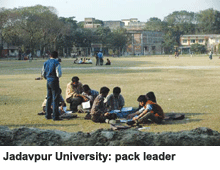 All through February, the 58-acre campus of Jadavpur University (JU; estb. 1955) in the southern suburbs of Kolkata — usually the centre of fiery debates and noisy election campaigns at this time of year — witnessed quiet electioneering. The event: elections to JU’s ‘Court’, the 65-member highest policy formulation body of the varsity, to which 15 members are directly elected by JU’s full faculty of 624 teachers. Ballots are due to be cast on February 25 (this report is being written earlier) and results will be known shortly after the Holi festival break in early March. Elections for these 15 seats are held once every four years. “The Court has influence but very little executive power,” comments a JU professor anonymously, because he does not wish to be seen as denigrating the august body.
All through February, the 58-acre campus of Jadavpur University (JU; estb. 1955) in the southern suburbs of Kolkata — usually the centre of fiery debates and noisy election campaigns at this time of year — witnessed quiet electioneering. The event: elections to JU’s ‘Court’, the 65-member highest policy formulation body of the varsity, to which 15 members are directly elected by JU’s full faculty of 624 teachers. Ballots are due to be cast on February 25 (this report is being written earlier) and results will be known shortly after the Holi festival break in early March. Elections for these 15 seats are held once every four years. “The Court has influence but very little executive power,” comments a JU professor anonymously, because he does not wish to be seen as denigrating the august body.
Civil electioneering apart, another first for JU this year is that for the first time in living memory, the election has taken a political flavour in the broad form of a Left versus others confrontation. Mainstream politics has spilled over into the JU campus following the Communist Party of India- Marxist (CPM)-led Left govern-ment, which has been ruling West Bengal (pop. 80.2 million) since 1977, vetoing a popular demand that JU be upgraded to the status of a Central university on the lines of the Visva Bharati University at Shantiniketan.
The consensus of opinion within West Bengal’s academia is unanimous that JU deserves Central university status. The Delhi-based University Grants Commission (UGC) has identified it as a Centre with Potential for Excell-ence, and the National Assessment and Accreditation Council (NAAC) has awarded five-star status to it. In other words, of West Bengal’s 18 state government run or aided universities, JU is the acknowledged leader of the pack.
Dr. Nilanjana Gupta, professor of English at JU, explains the involuntary politicisation of the recent Court election. “Court election campaigns are usually centred around local adminis-trative issues. But this time all campaigns had a wider political flavour because a majority of the faculty wants JU to be upgraded into a Central university. This is not only a natural progression in terms of status, but is likely to result in larger grants and Sixth Pay Commission scales for faculty. Hence the pressure for JU to be designated a Central university. But this demand has raised Centre-state political issues,” says Gupta.
However for this reason the JU faculty is not unanimous about the upgradation of JU into a Central university. Comments Court member Prof. Partha Pratim Biswas, a naysayer on this issue: “We have to first understand whether the Centre has any upgradation plans for JU before pressing the matter.”
Although there’s no clear answer as to how JU’s 624 teachers, 1,416 non-teaching staff, and 10,064 students enroled in the varsity’s 35 faculties, will benefit if JU is upgraded into a Central university, there is widespread awareness within the faculty that it’s more than just an academic question. The CPM leadership is unlikely to surrender its control over so many teachers, clerks and students in JU, which despite being state government controlled is well respected as testified by its UGC and NAAC ratings.
Therefore even if the faculty has voted solidly for JU to be converted into a Central university, it won’t worry the CPM leadership. After all, in the 65-strong Court, a massive chunk of 50 members are nominees of the state government which is run by the CPM. At least until the summer of 2011 when assembly elections are scheduled to be held and the CPM is expected to be given its long overdue comeuppance.
Sujoy Gupta (Kolkata)